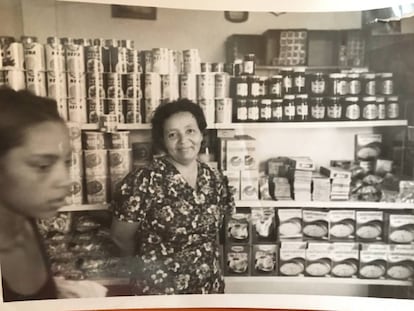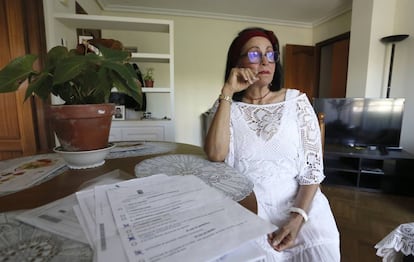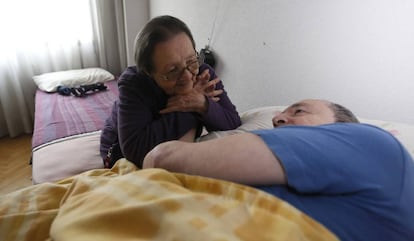The Venezuelan retirees trapped in Spain with no pension
Authorities in Caracas have stopped payments, exposing thousands of vulnerable expats to poverty

In late October, Ernesto Alegría died after suffering a long illness. He had moved to Venezuela in the 1950s as a young man, and after a 60-year career as a tailor he had retired to Spain in 2011 on a monthly pension of €2,400, protected by a preferential exchange rate set by the Venezuelan government, settling first in Madrid with his wife and daughter, and then moving to the seaside town of San Juan de Alicante coast for health reasons.
But last year, his pension was suddenly stopped. The family could no longer pay its rent, and Ernesto’s daughter María now finds herself on a debtors’ blacklist.
Ex-pat retirees must travel to Venezuela to recover their money
Her father was buried at the expense of the local council.
For the moment, María and her mother are surviving on food parcels provided by Catholic Church-run charity Cáritas.
Over the last year, around 12,000 retired ex-pat Venezuelans have ceased to receive their state pension, according to Venezuela's opposition-dominated Congress. Of these, some 9,000 are thought to live in Spain, with most others resident in the United States, Canada, Argentina, and Italy. The Venezuelan Ministry of Foreign Affairs has not explained why the payments have been cancelled.
Nadezka Medina is a 71-year-old retired school teacher who moved to Spain from her native Venezuela five years ago. Since 2015, she has not received her pension, and is barely surviving on her meagre savings, eating thanks to meals provided by friends. She now has just €100 in her bank account, although she is owed some €12,000 by the Venezuelan state, but has been given no indication as to when, or if, payments will resume. In the meantime, she spends her time trying to find out if the Spanish authorities can help her.

Nadezka is one of around 1,220 Venezuelan pensioners resident in the Spanish capital. Many of them have set up an association to ask for help from the regional government of Madrid. At the beginning of October, they met with officials who provided them with information on how to apply for a non-contributory pension or welfare payments.
Unable to pay her rent, Nadezka has taken out a €1,600 loan from a payday lender at 20% interest rates. She will now move in with her daughter and three grandchildren.
She has also had to exchange part of her savings in Venezuela for euros, which the friend of a son will bring to Spain. The South American country’s soaring inflation rate has devalued the currency, meaning that her 220,000 bolívar savings would have been worth €20,000 at the protected rate, but now add up to little more than €200.
Venezuela’s economy has been in crisis since the collapse of oil prices two years ago. In January, President Nicolás Maduro passed the first of a series of emergency measures. Since then, basic goods have become increasingly scarce.
Blanca, aged 79, was married to Pedro, a Spaniard who had emigrated to Venezuela in the 1950s, for 50 years in the northwestern state of Portuguesa, where, along with their five children, they ran a supermarket and sold fruit and vegetables they grew on their smallholding.

When the couple reached retirement age, they and their children moved to Spain. But Pedro soon fell ill, and within a couple of years died.
Shortly after her husband’s death, Blanca’s son, Jorge, aged 57, suffered a brain hemorrhage. He was due to be married for a second time, but the wedding was called off, leaving him totally dependent on his mother. The local authority provides a social worker who helps her wash and dress her son each morning. He will never resume a normal life, but his doctors say that over time he might be able to walk short distances, watch television, or accompany his mother shopping.
Over the last year, Blanca has received just two of the €1,300 monthly pension payments she is entitled to. If her other children had not been able to help out, she would have been evicted from her apartment.
Venezuelan students attending courses in Spain have also encountered difficulties in accessing funding due to foreign currency restrictions.
Venezuela halts pension payments
Venezuela's National Center for Foreign Trade (CENCOEX), responsible for foreign currency transfers to pensioners resident abroad, has ceased payments, in some cases, since July 2015, instead depositing the funds in a government account. To recover their money, ex-pat retirees must travel to Venezuela and formally request that their pensions be paid into a domestic account, but doing so would mean they would lose their status as expats, and would not be allowed to take their money out of the country due to Venezuela's restrictive monetary policies, and given the devaluation of the bolívar, the black market isn't an option either.
English version by Nick Lyne
Tu suscripción se está usando en otro dispositivo
¿Quieres añadir otro usuario a tu suscripción?
Si continúas leyendo en este dispositivo, no se podrá leer en el otro.
FlechaTu suscripción se está usando en otro dispositivo y solo puedes acceder a EL PAÍS desde un dispositivo a la vez.
Si quieres compartir tu cuenta, cambia tu suscripción a la modalidad Premium, así podrás añadir otro usuario. Cada uno accederá con su propia cuenta de email, lo que os permitirá personalizar vuestra experiencia en EL PAÍS.
¿Tienes una suscripción de empresa? Accede aquí para contratar más cuentas.
En el caso de no saber quién está usando tu cuenta, te recomendamos cambiar tu contraseña aquí.
Si decides continuar compartiendo tu cuenta, este mensaje se mostrará en tu dispositivo y en el de la otra persona que está usando tu cuenta de forma indefinida, afectando a tu experiencia de lectura. Puedes consultar aquí los términos y condiciones de la suscripción digital.








































